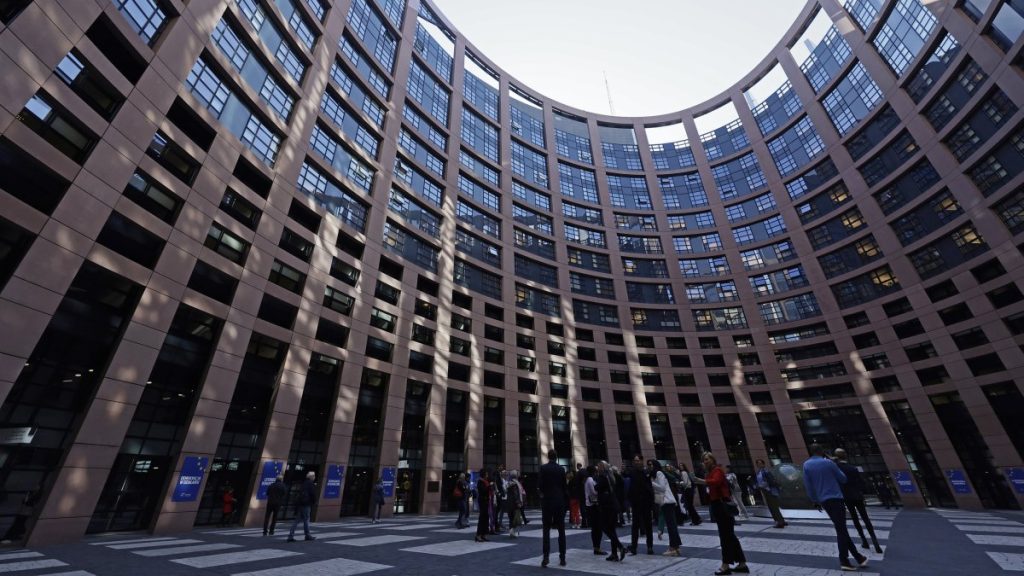The European Parliament engages in double standards while trying to interfere in Ankara’s judicial independence, Permanent Representative to the European Union, Ambassador Faruk Kaymakcı said on Thursday.
In a statement, the official responded to a series of meetings held on Türkiye during the European Parliament’s Plenary Session in Strasbourg from March 31 to April 3.
He criticized the sessions as politically motivated and an attempt to deflect from the EU’s internal difficulties.
“We find it strange that the EP (European Parliament) is trying to divert attention instead of confronting its own problems during this difficult period that the European Union (EU) is in,” the statement said.
He expressed concern over the general tone of the meetings, saying they had become a platform for extreme and unfounded rhetoric.
The European Parliament’s meetings on Türkiye came after opposition Istanbul Mayor Ekrem Imamoğlu was arrested on corruption charges on March 19, which led to widespread protests across the country.
“The transformation of the EP into a platform where irrational and tactless views are expressed is also worrying for the future of the EU,” he stressed, adding: “Indeed, the meetings in question have provided an opportunity for extremist and racist factions from all walks of life who aim to push Türkiye away from the EU.”
One of the most controversial moments came when European Commissioner for Enlargement Marta Kos announced that she would not visit Türkiye.
Kaymakcı described the move as politically charged, saying: “We consider the statement made by Marta Kos, the EU Commissioner for Enlargement, in one of the meetings, where she said she will not pay her visit to our country, as a move driven by political motives, aimed at satisfying certain circles within the EU.”
He stressed that such a stance from Kos contradicted the neutrality expected from the European Commission.
This week, Kos announced that she annulled her participation in the Antalya Diplomacy Forum (ADF) as well as a meeting with Foreign Minister Hakan Fidan in Ankara.
She said that Imamoğlu’s arrest “led to suspicions on Türkiye’s commitment to its deep-rooted democracy tradition.”
“Commissioner Kos’ stance is incompatible with the position of the European Commission, which is supposed to be impartial,” Kaymakcı emphasized.
The ambassador also criticized the EU for adopting an inconsistent approach to ongoing legal processes.
“It is unacceptable for the EU to display an approach that undermines the judicial independence and the rule of law in our country.
“It is contradictory and unconvincing that certain circles, who avoid commenting on judicial processes in some EU member states such as France and Romania, express their views on certain legal processes that have not yet been concluded in Türkiye,” he said.
A similar criticism also came recently from the spokesperson of the ruling Justice and Development Party (AK Party), Ömer Çelik, who said that France’s statements on Türkiye are a clear sign of double standards after French opposition chair Marine Le Pen was sentenced to a five-year ban on running for office.
‘Keeping open channels’
Meanwhile, the bloc said Wednesday it will carefully “recalibrate” its engagement with Türkiye, citing “worrying developments,” but insisted Ankara remained a key partner.
“Following the recent worrying developments, we need to carefully recalibrate our engagement, while of course keeping open channels to discuss topics of mutual interest, as Türkiye is a strategic partner for us,” said EU spokesperson Markus Lammert.
Relations between Brussels and Ankara have often had their ups and downs with disagreements on several regional issues as well as the EU’s criticism toward Türkiye’s internal processes.
Türkiye has the longest history with the union and the longest negotiation process. The country signed an association agreement with the EU’s predecessor in 1964, the European Economic Community (EEC), which is usually regarded as a first step to eventually becoming a candidate. Applying for official candidacy in 1987, Türkiye had to wait until 1999 to be granted the status of a candidate country. The process involved opening and then provisionally closing individual chapters, each representing a specific policy area, upon fulfilling the established criteria. By 2016, only 16 out of the 35 chapters had been opened, and only one had been provisionally closed. By 2018, the accession talks reached a standstill. The EU expressed dissatisfaction with what it viewed as a lack of progress on key issues, while Türkiye criticized what it perceived as double standards and a lack of commitment from the EU. This resulted in a de facto suspension of the accession process, leaving the future of Türkiye’s EU membership in a state of uncertainty.


